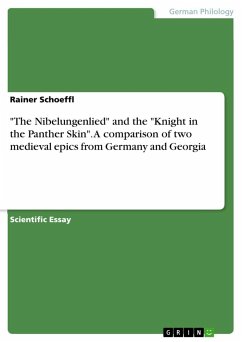Scientific Essay from the year 2016 in the subject German Studies - Older German Literature, Medieval Studies, grade: -, , language: English, abstract: Around the year 1200, an unknown poet from today's Germany composed the epic 'The Nibelungenlied' or 'Song of the Nibelungs' which became the national epic at the early 19th century.The Georgian national epic of the 'Knight in the Panther Skin' was created at around the same time as the 'Nibelungenlied' by Shota Rustaveli.This coincidence was the motivation to draw a comparison between both medieval poems.The paper includes synopses of both epics, followed by the description of the origin of courtly epic and the national epics in Western Europe and Georgia. After a general comparison of the 'Knight in the Panther Skin' with Western European medieval poetry, a detailed comparison with 'The Nibelungenlied' is provided.
Hinweis: Dieser Artikel kann nur an eine deutsche Lieferadresse ausgeliefert werden.
Hinweis: Dieser Artikel kann nur an eine deutsche Lieferadresse ausgeliefert werden.








